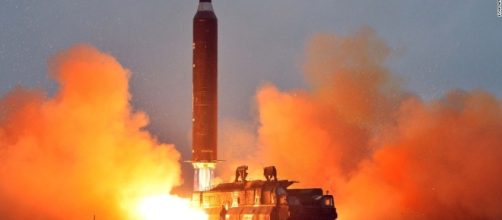The North Korean founder's day celebration commenced with a parade of military might in the city of Pyongyang over the Easter weekend. Tension throughout the region from Japan to the city of Seoul South Korea was at an all-time high, and it escalated to the point where military reinforcement was activated. During it all, the U.S. Military positioned an aircraft carrier and a Navy strike force, armed with Tomahawk Cruise missiles right off the Korean peninsula.
The threat continues
The tension increased in that region of the far East due to the concern over North Korea conducting its sixth nuclear/ballistic missile test around the celebration of Kim II Sung's birthday, which is called the “Day of the Sun.” In the capital city of Pyongyang, there was a festive atmosphere.
There were families out taking pictures of the military prowess of their country as tanks rolled by, alongside and behind a marching army that was followed by a variety of missiles carried on special transport vehicles. Above it all was a proud, young leader who stood watching on a podium alongside his countrymen to salute their arrival.
Athough there was no mention, nor knowledge of a missile test taking place at that time, the following morning at 10:00 am, North Korea's latest ballistic missile test failed. “The North Korean missile blew up almost immediately after its test launch on Sunday,” the U.S. Pacific Command said. Hours later, U.S. Vice President Mike Pence landed in South Korea for talks on the North's increasingly defiant arms program.
The tension has been rising ever since Trump took a hard rhetorical line with North Korean leader Kim Jong-Un.
Twitter threats do not solve problems
“North Korea is looking for trouble,” Trump tweeted. “ If China decides to help, that would be great. If not, we will solve the problem without them! USA.”
President Trump's belligerent message was tweeted due to the fact that on several occasions Kim Jong-Un has rejected the warnings from China to cease and desist its testing and has continued to proceeded with nuclear and missile programs which Washington sees as a direct threat, while Trump has employed tough, and sometimes senseless rhetoric in response to North Korea's recent missile tests, “The United States must greatly strengthen and expand its nuclear capability until such time as the world comes to its senses regarding nukes.” It has no doubt captured the attention of North Korea.
Dangerous interpretation
As stated on MSNBC's "Rachel Maddow Show": “international nuclear diplomacy shouldn’t be conducted by confused amateur presidents, 140 characters at a time.” Furthermore, Jeffrey Lewis, a nuclear non-proliferation expert points out that in peacetime, tweets about nuclear weapons might not appear alarming because of “confirmation bias” that will lead the key actors to not interpret the message in its most frightening light at that moment. However, “Amid rising international tensions though; confirmation bias might work in the other direction” In essence, if we are in a crisis situation, people could read reckless tweets as the worst possible scenario.
The foreseeable resolve
Nonetheless, Vice President Pence is on a 10 day visit to this region for the purpose of reassuring South Korea and Japan of our alliance with them, and to seek negotiations with North Korea via China. Most of the options fall into four categories: “economic sanctions, covert action, diplomatic negotiations and military force." Although K.T. McFarland, Trump's deputy national security adviser declined to answer whether the U.S. sabotaged the Korean missile test, he did say that, "The United States, its allies and China will be working together on a range of responses to North Korea's latest failed ballistic missile test.” H.R. McMaster indicated that Trump was not considering military action for now.
"It's time for us to undertake all actions we can, short of a military option, to try to resolve this peacefully."
In addition, the resolve for now is to raise the stakes, with the Trump administration focusing its North Korea strategy on tougher economic sanctions, possibly including an oil embargo, a global ban on its airline, intercepting cargo ships and punishing Chinese banks doing business with Pyongyang. Pence formally cited that “Patience is over. All options are open.”

